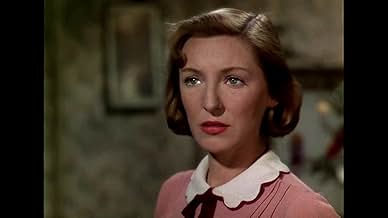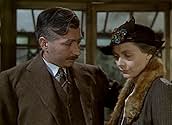IMDb रेटिंग
7.3/10
4.5 हज़ार
आपकी रेटिंग
अपनी भाषा में प्लॉट जोड़ेंA chronicle of the lives of the Gibbons family, from shortly after the end of World War I to the beginning of World War II.A chronicle of the lives of the Gibbons family, from shortly after the end of World War I to the beginning of World War II.A chronicle of the lives of the Gibbons family, from shortly after the end of World War I to the beginning of World War II.
- पुरस्कार
- कुल 1 जीत
Robin Burns
- Man in Crowd
- (बिना क्रेडिट के)
Mabel Etherington
- Lady in Crowd
- (बिना क्रेडिट के)
Dan Lester
- Man in Crowd
- (बिना क्रेडिट के)
Jim Morris
- Man Operating Small Boats at Fairground
- (बिना क्रेडिट के)
7.34.4K
1
2
3
4
5
6
7
8
9
10
फ़ीचर्ड समीक्षाएं
Much like Cavalcade but more accessible
This British Technicolor domestic drama from Eagle-Lion and director David Lean charts 20 years in the life of the Gibbons family, from 1919 to 1939. Husband Frank (Robert Newton) has just returned from fighting in WW1, and he and his wife Ethel (Celia Johnson) are moving into a new home in a crowded working class neighborhood. We follow them as they have children, raise them, and deal with the various ups and downs of family life, all leading up to the outbreak of WW2. Also featuring John Mills, Kay Walsh, Stanley Holloway, Eileen Erskine, John Blythe, Amy Veness, Alison Leggatt, and the voice of Laurence Olivier.
Based on a play by Noel Coward, this bears some thematic similarities to 1933's Cavalcade. This is more accessible though, and certainly much better made. Technically the movie is a marvel, with perhaps the best looking color cinematography, courtesy of Ronald Neame, up to this point in film. Lean's direction is also very admirable, with interesting and innovative camera movement. There's one truly outstanding scene wherein a person who has bad news to share exits out of the back door into a garden to relay the message, only the camera stays inside the house, moving a bit, looking out into the backyard but not seeing the news being delivered, all the while loud, upbeat music is blaring from a radio. It's a shattering scene that depicts the often banal setting for life-changing developments. Unfortunately I found much of the rest of the movie uninvolving. The acting is good, very natural and played in the medium to low register. I just couldn't bring myself to get emotionally connected with much of it.
Based on a play by Noel Coward, this bears some thematic similarities to 1933's Cavalcade. This is more accessible though, and certainly much better made. Technically the movie is a marvel, with perhaps the best looking color cinematography, courtesy of Ronald Neame, up to this point in film. Lean's direction is also very admirable, with interesting and innovative camera movement. There's one truly outstanding scene wherein a person who has bad news to share exits out of the back door into a garden to relay the message, only the camera stays inside the house, moving a bit, looking out into the backyard but not seeing the news being delivered, all the while loud, upbeat music is blaring from a radio. It's a shattering scene that depicts the often banal setting for life-changing developments. Unfortunately I found much of the rest of the movie uninvolving. The acting is good, very natural and played in the medium to low register. I just couldn't bring myself to get emotionally connected with much of it.
A gem
Whether or not, one agrees with the "truth or morality" of Noel Coward's ennobling view of the British "bourgeois" from 1919-1939, the acting and direction in "This Happy Breed", are superb, and what a cast. I think the notion of sacrifice, pride, and work ethic, might have easily been written about many similar low and middle income families in America from Brooklyn to San Francisco, during the same period, as it was portrayed in the equally, excellent film, "Best Years of our Lives" (1946)
Up there with the very best. Wonderful !
This film caught me completely unawares. I had never heard of it until it presented itself on daytime television one afternoon. I really dislike this type of film, as I find most of the time is spent on mediocre happenings in predictable situations. (Ordinary peoples lives are very boring). I was therefore amazed at the fact that I couldn't leave it, Maybe it's because I am getting older or maybe the people in this film reminded me of the adults of the 1950's when I was a child.
The acting is absolutely superb, you really believe in this family and the ups and downs of their lives. The direction of David Lean polishes the excellent cast performance, what more can I say ! ......Fantastic.....
The acting is absolutely superb, you really believe in this family and the ups and downs of their lives. The direction of David Lean polishes the excellent cast performance, what more can I say ! ......Fantastic.....
A very British class act
Old-fashioned? Arch dialogue? Stiff acting? Viewable only as an historical document? Guilty on all counts, but this film still captivates. Made during the second World War, it was probably intended as a flag-waver, a morale booster for the worn-down citizens of Britain, but in fact is much more than that. The story (Noel Coward) deals with the lives and times of an ordinary family in 'between the wars' London. There is nothing dramatic, just the everyday events and the weddings, births and funerals that visit us all. However, there are some wonderfully quiet scenes - the father-to-son talk before the son's wedding is especially notable for its old-fashioned moral uprightness, the way the camera lingers in an empty room when the family learns of a terrible road accident, and Frank's gentle chat with his neighbour over a few glasses of whisky as they prepare to go their separate ways. Director David Lean handles these with care and reserve. The way the family deals with the mini-dramas that beset them was no doubt meant to say to the war-weary people that we may be a middling, grey little society with predictable ways, but it was worth fighting for. The film always leaves me a little melancholy, missing an age that still existed in many ways when I was a youngster. No doubt to a modern cinema audience that can't manage without an explosion or car-chase every ten minutes this would be regarded as dull and boring, but I love its charm.
Agreeable portrait about a bourgeois family during thirty years
The movie narrates the happenings of a British family since the first world war (1914-18) until the end second world war (1939-45) . The parents (Robert Newton and Celia Johnson) , the troubled and rebel daughter (Kay Walsh) , the friendly neighbor (Stanley Holloway) , the seaman son (John Mills) and others . Meanwhile , being reflected the course of time and are succeeding various historic deeds , thus : the first and second world wars , the soldiers recruitment , death of the king George , the jolly reception to Minister Chamberlain after the useless Munich Convention with Hitler , the trenches digging in preventing the bombing over London by the Germans .
The movie is interpreted by the greatest English actors with important careers . Robert Newton (Treasure island) , Celia Johnson (Brief encounter) , John Mills (Daughter of Ryan), Kay Walsh (Oliver Twist), Stanley Holloway (My fair lady) . Colorful and glittering cinematography by Ronald Neame , a future director with many successes (Adventure of the Poseidon) . Musical conducting by Muir Mathieson , habitual of English classic films , as he was director of symphonic orchestra of London . The picture begins and finishes with a camera travelling from exterior and interior home what it subsequently would be copied in a lot of films (for example : The Family by the director Ettore Scola) . The motion picture was perfectly directed by David Lean considered the greatest British filmmaker . Rating : Awesome . Above average.
The movie is interpreted by the greatest English actors with important careers . Robert Newton (Treasure island) , Celia Johnson (Brief encounter) , John Mills (Daughter of Ryan), Kay Walsh (Oliver Twist), Stanley Holloway (My fair lady) . Colorful and glittering cinematography by Ronald Neame , a future director with many successes (Adventure of the Poseidon) . Musical conducting by Muir Mathieson , habitual of English classic films , as he was director of symphonic orchestra of London . The picture begins and finishes with a camera travelling from exterior and interior home what it subsequently would be copied in a lot of films (for example : The Family by the director Ettore Scola) . The motion picture was perfectly directed by David Lean considered the greatest British filmmaker . Rating : Awesome . Above average.
क्या आपको पता है
- ट्रिवियाThe voice of the uncredited opening narrator is that of Laurence Olivier.
- गूफ़Frank is shown reading a copy of the 16 September 1930 edition of the Daily Mirror with the headline story about the elections in Germany held on 14 September where the Nazi Party increased their seats in the Reichstag from 12 to 107. He then goes to the back yard to help shake out the tablecloth, but the cherry tree there is still in full bloom, months after the blossoms should have disappeared.
- भाव
Frank Gibbons: She didn't pass on, pass over, or pass out! She died!
- क्रेज़ी क्रेडिटOpening credits prologue: This is the story of a London family from 1919 to 1939.
- कनेक्शनFeatured in Jonathan Ross' Must-Watch Films: Crime Films (2023)
- साउंडट्रैकRule Britannia
(uncredited)
Lyrics by James Thomson
Music by Thomas Augustine Arne
Sung by Robert Newton (Frank) and Stanley Holloway (Bob) coming home after their reunion
टॉप पसंद
रेटिंग देने के लिए साइन-इन करें और वैयक्तिकृत सुझावों के लिए वॉचलिस्ट करें
- How long is This Happy Breed?Alexa द्वारा संचालित
विवरण
- रिलीज़ की तारीख़
- कंट्री ऑफ़ ओरिजिन
- भाषा
- इस रूप में भी जाना जाता है
- Srecna porodica
- फ़िल्माने की जगहें
- Alderbrook Road, London, Greater London, इंग्लैंड, यूनाइटेड किंगडम(exteriors of family house near corner with Bellamy St. - still standing in 2022)
- उत्पादन कंपनियां
- IMDbPro पर और कंपनी क्रेडिट देखें
बॉक्स ऑफ़िस
- बजट
- £2,00,000(अनुमानित)
- दुनिया भर में सकल
- $158
- चलने की अवधि
- 1 घं 55 मि(115 min)
- पक्ष अनुपात
- 1.37 : 1
इस पेज में योगदान दें
किसी बदलाव का सुझाव दें या अनुपलब्ध कॉन्टेंट जोड़ें

































